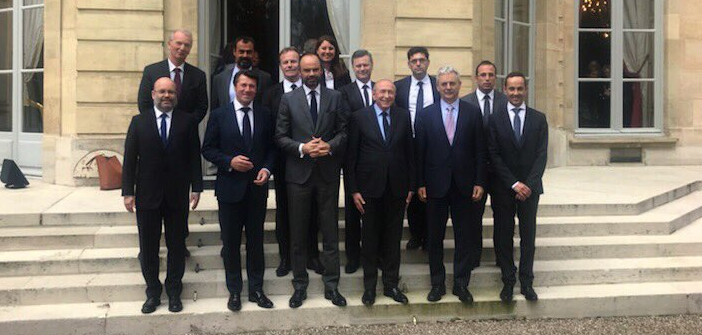The City Council session, which was supposed to approve the financial contract between the State and the City, lasted only long enough for a few sharp critiques from the opposition directed at Christian Estrosi in a Saint Sebastian version.
Indeed, the contents of this document were widely known after its presentation on April 4th in the presence of the Prefect of the Alpes-Maritimes and the Departmental Director of Public Finances who had validated it.
Approved without any opposing votes (the opposition abstained), it was signed in the afternoon at Matignon in the presence of the Prime Minister and the Minister of the Interior, simultaneously with the city and metropolitan area of Bordeaux, the cities and urban communities of Reims and Perpignan, the city of Niort, and the departments of Tarn-et-Garonne, Loir-et-Cher, and Seine-Maritime.
The Nice delegation was composed of the highest municipal hierarchy and some representatives of the economic sector. The mayor of Cagnes-sur-Mer, Louis Nègre, was also present (one wonders in what capacity, but there surely must be one…).
In fact, the real positive novelty of this “confidence contract” is a preventive audit by State services on the city’s budgetary policy and its three-year duration, which allows for medium-term actions and corrections.
A “managerial” approach rather than a bureaucratic one, undoubtedly innovative but perhaps not in the way Christian Estrosi interprets it, who sees it as a sort of reward for his “good management” (Nice is part of a list of 322 local governments: all rewarded?).
Moreover, one could make an opposing reading: by aligning the budgetary policy of local governments for three years, doesn’t the State control an important aspect of public economy (operating costs, investment capacity, debt level, debt reduction capacity)?
Of course, the local governments gain the stability of allocations (DGF), which is anything but negligible, thus avoiding the “hot and cold” policy that determines uncertainty (how much reduction this year?) and fuels controversial positions (for the record, Christian Estrosi did not refrain from it during the last five years).
The opposition parties (opposing as their role dictates) wielded the “blunderbuss” to decry the propagandist use of a more technical than political document.
Indeed, expressions like “exceptional and excessively ambitious efforts” or “this contract is one of the most exemplary in the country” resemble more advertising slogans, such as “washes whiter than white,” than a correct political analysis, even with the indulgent eye of one looking at themselves in the mirror!
Olivier Bettati (DvD) certainly exaggerates (the dispute between the two men is personal) or perhaps (everyone has the right to their point of view) when he denounces a “completely empty contract.”
But why doesn’t the Mayor of Nice stick to the insightful Latin maxim “tanto nomini nullum par elogium”?
Moreover, the fact that not everything shines brightly was highlighted by Dominique Boy-Mottard (DvG), who pointed out the calculation method of debt reduction “which shows a discrepancy between that of the State and yours.”
Estimated at 12 years (repayment capacity ratio), the City estimated it at 6.31 years, while the “financial contract” holds it at 16.38 years*. The difference is explained by property sales (Ikea, Ray) that the City took into account even though they haven’t yet been realized… but they will be.
“By signing this pact of trust with the State, the City of Nice makes virtuous commitments that it could not have honored if it were not in good financial health” – is the final self-congratulatory statement by Christian Estrosi.
“False” – protested Patrick Allemand (Another future for Nice): “You still have the audacity to say you were selected for your good management! The truth is you’re offering us to vote for a rescue plan where you’re forced to bow to the State’s requirements.”
And what if we set aside the settling of scores and hyperbole to return to the fundamentals?
In that case, we could accept the declaration by Prefect Leclerc: “the plan is good and solid.”
All that remains is to implement it.


